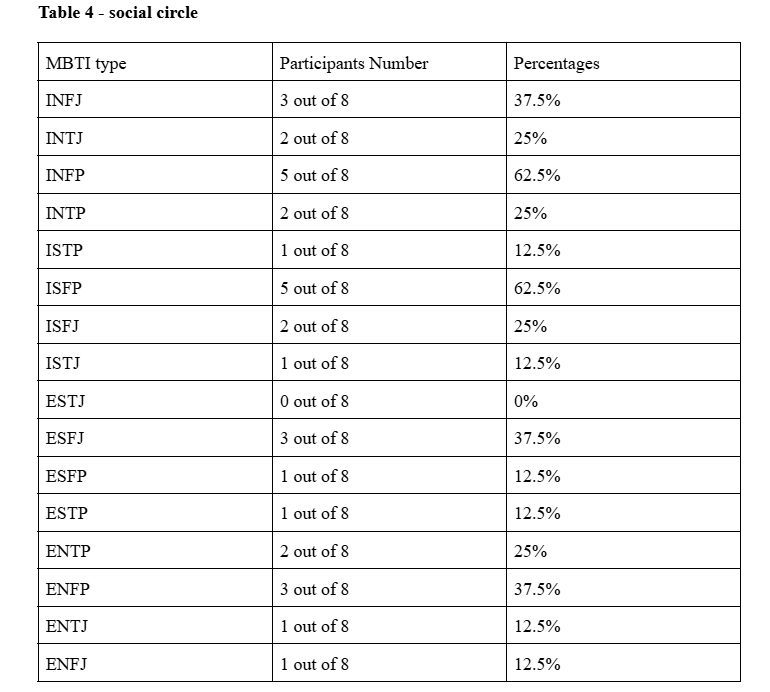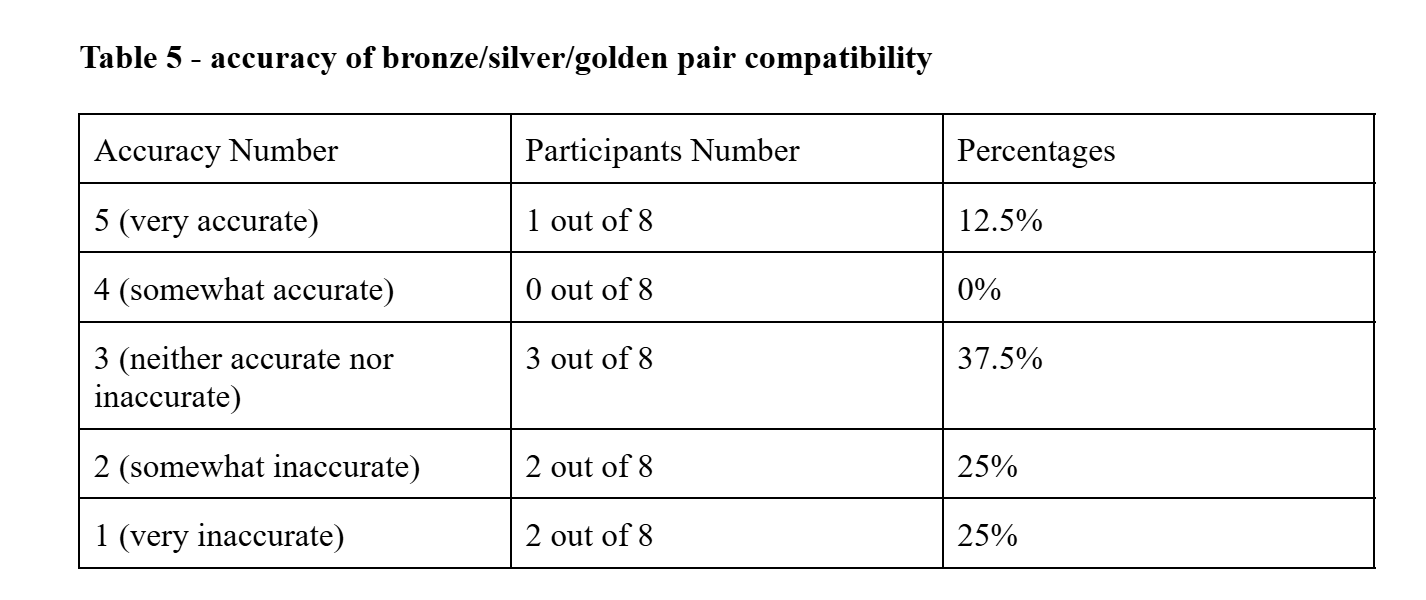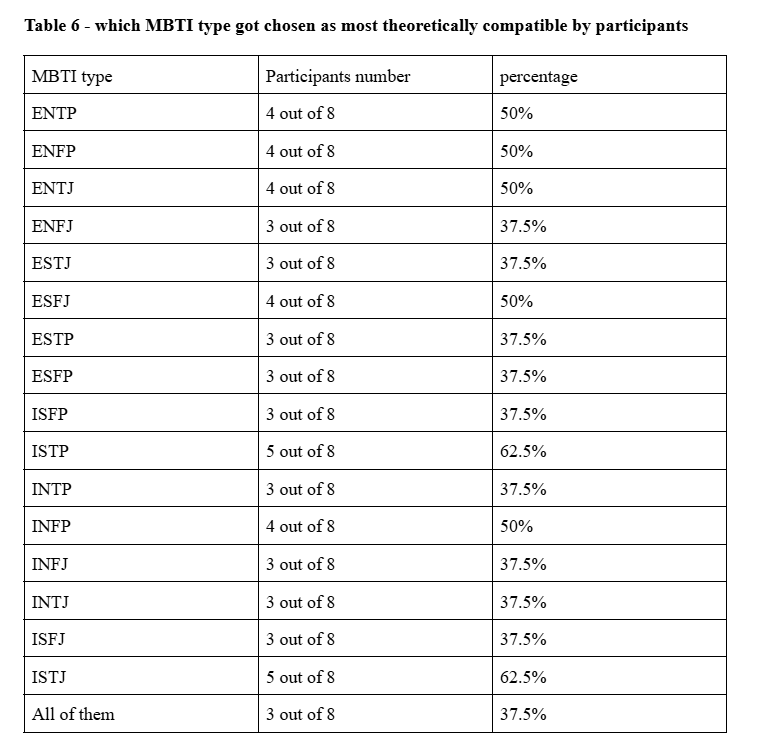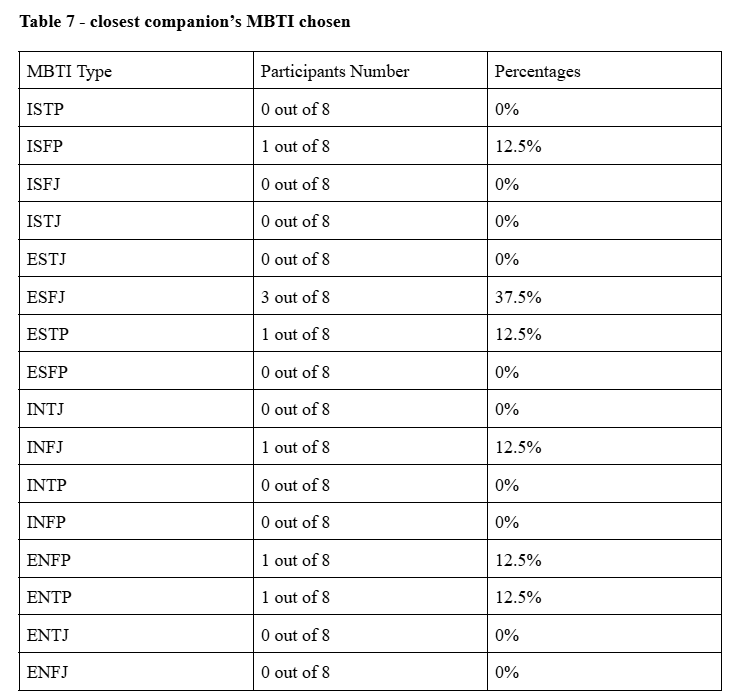ESTJ Compatibility Analysis

ESTJs have the lowest participation rates in my survey, with only 8 participants who have responded. Most of the ESTJ participants in my survey don’t have a close companion who is an ISTP, which is their golden match. However, most of them tend to have an ISFP and INFP close companion, which is their silver and bronze matches. There is also a common occurrence in which, aside from the silver and bronze pairings that ESTJ may have a connection with, they also seem to be close with ESFJs, ENFPs, and INFJs. A few of them even have a companion that includes INTJs, INTPs, ISTPs, ISTJs, ISFJs, ESFPs, ESTPs, ENTPs, ENTJs, and ENFJs. A fascinating fact to know is that half of ESTJs tend to choose ESFJs as their best theoretical matches, but it is one-sided, as only a few ESFJs choose ESTJs as their best matches.



ESTJ's Thoughts on The Theory

The majority of the ESTJ individuals believe that the golden/silver/bronze theories are either accurate or inaccurate or inaccurate as most of them gave the theory 1-3 out of 5 for the accuracy scaling. This suggests that most ESTJs don’t believe that the best pairs theory is very accurate. The reason they believe that it isn’t accurate is that this type of theory involves more than just MBTI typing to make a relationship work. A few had stated that compatibility needs shared values, maturity, tolerance of their differences, to make a relationship work, since MBTI can be used to understand each other better. Others have said that it is simply just a theory, and their personal experience speaks to the fact that it may not be very accurate to what the theory says. In addition, some participants who rated the theory to be not very accurate have stated that they do not have any close companions with the MBTI types of their gold/silver/bronze pairings. As for a participant who believed that the theory was accurate, their reason was due to the fact that having a close companion who was opposite yet similar in a sense can cause growth without having major misunderstandings or conflicts.
Who do the ESTJs think they are compatible with?

Some ESTJs believe that they can theoretically get along with any type since they don’t believe MBTI types matter as long as both parties get along with each other. An individual spoke that they can technically get along with any MBTI type, but had chosen ISFJ if they had to pick one, because of the fact that ISFJs are chill, laidback, and engaging when wanting to converse with them. In addition, they see ISFJs as wanting to keep the peace and avoid drama. Two ESTJs chose either ESFJ or ENTP as their theoretically best match due to the fact that their current spouse is of those two types for many years. They spoke that they liked those two types due to either having quite a few ENTP best friends as well as an ENTP spouse, and having healthy long-term relationships in the past and the present with ESFJs. One person expressed that their best matches are ENTJ and ISTJ due to the fact that they have similar functions to an ESTJ. Another individual voiced their top choices were ISTP and INFP because they believe those types can give them the connection they need by being able to support them to do better, are strong, caring, and take the time to understand and listen to them, as well as have vulnerable and deep conversations. Lastly, one ESTJ chose ENFP, ISTP, and ISTJ as their best pairings since their life is peaceful around them.

What do They think on Sensors vs. Intutives?

A majority of ESTJs believe that sensors and intuitives get along with their reasoning being the fact that it’s just a matter of differences in having thinking processes, which shouldn’t cause major conflict. Some other types of reasons include the fact that they can get along with enough effort to understand each other from both parties, and could balance each other out based on their different thinking processes. A few stated that maturity, healthiness, reasonableness, and having a personal connection are more important than typology to determine whether they can get along. Finally, the minority of the ESTJ that does not believe that they get along is because they see intuitives as people who are too into their thoughts and feelings, so the ESTJ feels unable to relate to them. They also don’t like the fact that intuitives may take a long time to make a decision.
Conclusion
In conclusion, ESTJs generally don’t believe the compatibility theory to be very accurate since they each have their preferences for preferring MBTI types that are more similar to them or believe that MBTI types don't matter when having a good relationship with someone. The ESTJs that did choose some MBTI types as their top matches chose the ones that were mostly extraverted thinkers, extraverted sensors, extraverted typings, or introverted sensors. A few chose their best matches as the MBTI typings that have similar functions to them, such as being Te/Fe dominant and Si auxiliary/dominant functions. The majority of these participants chose an extroverted type as their closest companion compared to the minority choosing an introverted type.